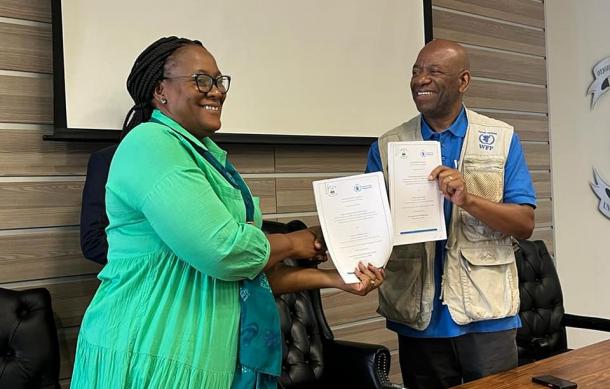
The Otjozondjupa Regional Council has joined forces in partnership with the World Food Programme (WFP) to promote sustainable food systems in the region.
The two parties signed a Memorandum of Understanding, which would see them come up with innovative programmes in food production aimed at improving the social and economic standards of the region's inhabitants.
Otjozondjupa Regional Council Chairperson Marlayn Mbakera said the agreement is needed as the country faces challenges in addressing food security and nutrition.
"The Sustainable Food System Programme under this agreement is aimed at addressing key drivers of food and nutrition insecurity and stunting the long-term trends of raising hunger, emergency preparedness, market access, distribution, and consumption—the whole value chain from production through to consumption. It is therefore my conviction that this agreement will culminate in positive changes in the lives of the people of Otjozondjupa Region as it will enable them to become self-reliant through this sustainable Food Systems Programme."
The World Food Programme country director, Dr. George Fedha, says the organisation works with 1,350 schools and 3,075 learners and that the MOU will help alleviate the burden on government feeding programmes.
"But now we have started working with the government to shift that mindset to say instead of the government spending a lot of money tendering contracts to buy food from outside and take it to the schools, how about the farmers around these schools be encouraged to grow healthy foods to sell to the schools? The same resources but much less expenditure by the government and more production of nutritional outcomes, so these are the programmes that I think are working with the community in Otjozondjupa; what are the successes gained, for example, in the Tsumkwe project?"
Otjozondjupa Regional Governor James Uerikua urged the WFP to collaborate with subsistence farmers, who are most affected by a lack of market for their produce.
"We need to diversify in terms of production systems. Because global warming and climate change have led us to this space, we need to produce more resilient and drought-adapting cultivars or varieties that can withstand the test of time as far as drought is concerned. We have land, unoccupied land, because of the lack of water, roads, skills, capacity, and support mechanisms. You are coming to the table today as WFP, where we are signing this framework."





